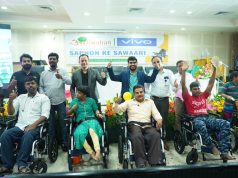CRY: Immunisation Gaps Leading To 11 Lakh Infant Deaths A Year
Take the case of Tilakpur, a small hamlet in Uttarakhand with 25 families who work as labourers. Children in the age group of 0-5 years did not receive any vaccines and neither was their birth registered, as the villagers did not feel the need for it. CRY along with partner Lok Prabandh Vikas Sansthan (LPVS) went door to door to create awareness on the importance of immunisation. What ensued was continued counselling and sensitising each family and parent who initially resisted the idea. After regular talks, the LPVS team got the Auxiliary Nursing Midwife (ANM) to visit each house and immunise the children. Regular meetings with government officials resulted in a mini Anganwadi being built in the village. Today, because of these continuous efforts, every child in the village is immunised.
But all the villages in India are not as lucky as Tilakpur, pneumonia, meningitis, malaria, dengue and diarrhoea and other vaccine preventable diseases are the prime reasons that prevent children from reaching their first birthday. Though the government provides key vaccines for free, lack of access to these life saving vaccines cause 11.6 Lakh children to die each year. Some of the key barriers to immunisation are:
 Lack of awareness on the need for completing immunisation at the correct age. Even if the child comes beyond the due date for a vaccine, the child should receive all the due vaccines.
Lack of awareness on the need for completing immunisation at the correct age. Even if the child comes beyond the due date for a vaccine, the child should receive all the due vaccines.- Long distances between the villages and the nearest Public Health Centre (Approx over 10 kms)
- Lack of awareness among mothers. Studies have proved that children whose mothers were educated up to primary or above had an increased probability of being fully immunised.
- Lack of qualified health professionals at State/District level/block level of Doctors, Auxiliary Nursing Midwifes and ASHA workers
- Inadequate infrastructure. For example: lack of refrigeration facilities in health sub-centers, limited ice boxes to store the vaccines
- Inadequate delivery of health services in remote areas
- Migration of families is a deterrent to complete the child’s entire immunisation cycle
Talking about the initiative, Anita Bala Sharad, Director, Resource Mobilisation, CRY says, “Immunisation plays an extremely critical role in reducing child and infant mortality. The statistics however reflect an alarming trend. The first birthday is a celebration of survival, one that an estimated 11.6 lakh children every year do not live to enjoy. Though the government provides key vaccines for free, lack of access to these life-saving vaccines cause children to die each year. With this initiative, CRY aims to ensure that communities and parents gain access to these vaccines for their children, which is imperative to minimise risk of death by preventable diseases.”
 At the grassroots level, CRY along with its partners work towards ensuring that the local Public healthcare and the Agandwadi centres have the necessary infrastructure and qualified health workers (ASHA workers, Auxiliary nursing midwives and Integrated Child Development Scheme centre workers) to provide effective delivery of quality maternal and child health care. This would be achieved by making communities and parents aware of the need of immunisation through women group meetings, street plays, wall writings and other local communication tools. Another integral part of the work also includes identifying and monitoring pregnant women and children in need of immunisation and work with public healthcare centres to ensure proper pre natal care, adequate food and timely health checkups for both. To ensure reach out to every child, specific intervention is designed to identify and address all children who have dropped out of the immunisation cycle.
At the grassroots level, CRY along with its partners work towards ensuring that the local Public healthcare and the Agandwadi centres have the necessary infrastructure and qualified health workers (ASHA workers, Auxiliary nursing midwives and Integrated Child Development Scheme centre workers) to provide effective delivery of quality maternal and child health care. This would be achieved by making communities and parents aware of the need of immunisation through women group meetings, street plays, wall writings and other local communication tools. Another integral part of the work also includes identifying and monitoring pregnant women and children in need of immunisation and work with public healthcare centres to ensure proper pre natal care, adequate food and timely health checkups for both. To ensure reach out to every child, specific intervention is designed to identify and address all children who have dropped out of the immunisation cycle.
CRY will also be reaching out to its supporters to sensitise them on the issue of lack of access to immunisation and solicit their support. CRY is also organising on-ground activities to engage the general public apprising them of the criticality of this issue. To know more, you can visit the CRY initiative at www.cry.org/happyfirstbirthday.














